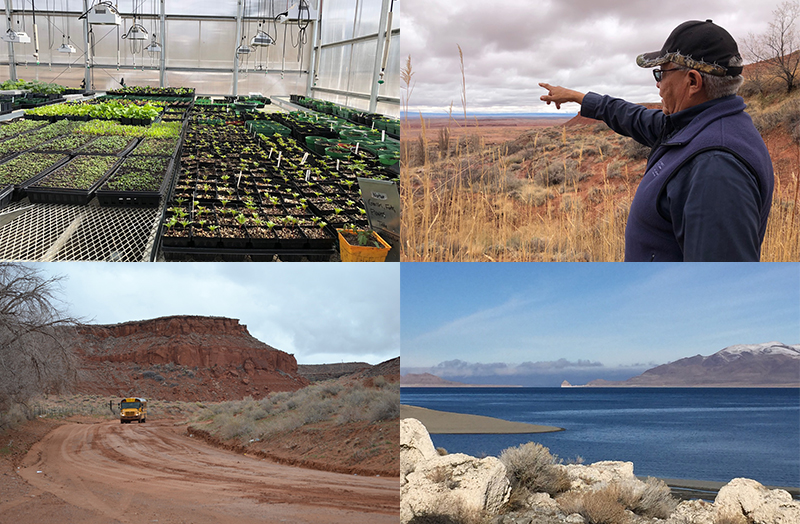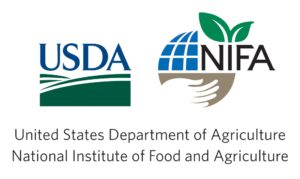New USDA Grant to Support Climate Resilience Planning in Indian Country
“Native Climate” project will build relationships and narrow the climate justice gap in Native American communities of the Intermountain West
Shared from the Desert Research Institute
Reno, Nev. (Jan 13, 2022) – A collaborative team of researchers led by Maureen McCarthy, Ph.D. of DRI has received a $1.5 million grant from the U.S. Department of Agriculture’s National Institute of Food and Agriculture (USDA-NIFA) to support and strengthen the role of USDA Climate Hubs in Indian Country.
The USDA Climate Hubs work across ten regions of the U.S. to support agricultural producers and professionals by providing science-based, region-specific information about climate change and climate adaptation strategies. The new DRI-led project, titled “Native Climate: Strengthening the role of Climate Hubs in Indian Country,” will support the Climate Hubs by expanding the reach of their services and outreach to Tribal Extension agents, agricultural producers, and youth educators in the Southwest and Northern Plains regions.
“From heatwaves to extreme winds, droughts, wildfires, and floods, the climate crisis poses huge adaptation challenges to Native American communities in the Intermountain West – and there are huge inequities across the U.S. in providing climate services and resources to Tribes,” said McCarthy, Native Climate program director from DRI. “Many of these communities are incredibly resilient and forward-thinking in terms of finding ways to adapt to this rapidly warming world, and their knowledge of the landscape pre-dates modern science. This project is an amazing opportunity to build connections and sustainable, trusted relationships that support information sharing between Tribal communities, Climate Hubs, Tribal Extension partners, researchers, and educators.”
Native Climate will address long-standing issues related to climate injustice in Indian Country through culturally-appropriate information sharing and by increasing the representation of Native American Tribal members in climate-related research and outreach positions. The project team includes researchers, Tribal Extension educators, and Climate Hub leaders from DRI, the University of Nevada, Reno Extension, the University of Arizona, the University of Montana (UM), and the Southwest and Northern Plains Climate Hubs.
The project supports the hiring of several Native Climate Fellows, who will work directly with the Southwest and Northern Plains Climate Hubs in coordinating climate data needs, extending outreach to agricultural producers, and sharing youth climate education materials. One Native Climate Data Fellow will be stationed in the Montana Climate Office (MCO) at UM. A second Native Climate Agricultural Producer Fellow will work through UNR-Extension, and a third Native Climate Youth Education Fellow will be hired by DRI.
DRI’s Native Climate Youth Education Fellow will work with mentor Meghan Collins, M.S., to continue growing an existing Teaching Native Waters Community of Practice, which fosters communication between educators, FRTEP agents, and scientists. This Fellow will also work with the Climate Hubs and other NIFA project teams to adapt climate education resources to be place-based and culturally relevant.
“Educators, scientists, decision-makers, and leaders all have important knowledge to bring to the table,” said Collins, assistant research scientist at DRI. “This community of practice creates spaces for us to listen, respond, and innovate. Together, we are seeking solutions that engage youth in closing the gap in climate justice.”
The project will also create a new student internship program for Native Climate Reporters at DRI, which will support three or more Native students a year studying communications, journalism, agriculture, or STEM. The interns will report on stories about climate impacts and adaptation by tribes in their regions, and gain experience developing and producing multi-media communications, with mentorship from Native Climate Communications Coordinator Kelsey Fitzgerald, M.A.
“Only a very small percentage of journalists at U.S. news organizations are Native people, which has a huge impact on the news coverage we see or don’t see about climate change and other challenges being addressed by Tribal communities,” said Fitzgerald, senior communications official at DRI. “We are so excited to be able to provide this opportunity for Native students interested in climate reporting to develop their communications experience and skills so that they can play an active role in providing more accurate news coverage and telling the stories that are important to their regions.”
Other components of the project include a “Native Climate Toolkit” – a web-based interactive resource clearinghouse, and impact reporting and alert tools. A Native Climate Advisory Group will help the team engage tribes in the region, leverage resources from partner organizations, and conduct culturally-respectful project evaluation.
Native Climate builds on partnerships established under previous USDA-funded projects Native Waters on Arid Lands, the COVID CARE Toolkit Project, All Climate is Local virtual conference, and Teaching Native Waters. Native Climate will begin in March 2022 and run through March 2027.
More information:
To view the award announcement from USDA, please visit: https://www.usda.gov/media/press-releases/2022/01/12/usda-invests-9m-expand-reach-and-increase-adoption-climate-smart
###
About DRI
The Desert Research Institute (DRI) is a recognized world leader in basic and applied environmental research. Committed to scientific excellence and integrity, DRI faculty, students who work alongside them, and staff have developed scientific knowledge and innovative technologies in research projects around the globe. Since 1959, DRI’s research has advanced scientific knowledge on topics ranging from humans’ impact on the environment to the environment’s impact on humans. DRI’s impactful science and inspiring solutions support Nevada’s diverse economy, provide science-based educational opportunities, and inform policymakers, business leaders, and community members. With campuses in Las Vegas and Reno, DRI serves as the non-profit research arm of the Nevada System of Higher Education. For more information, please visit www.dri.edu.



